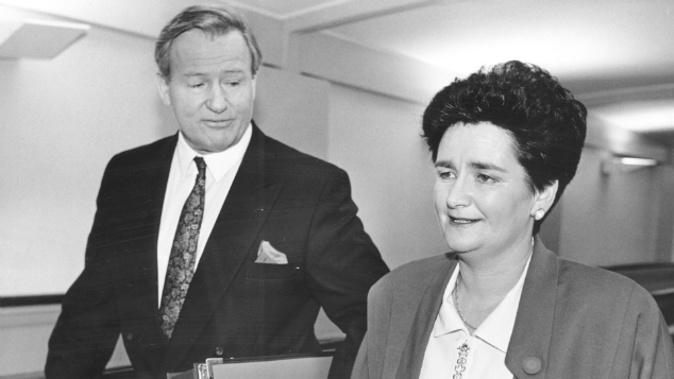
The word 'neoliberalism' appears three times in Andrew Dean's new book Ruth, Roger and Me. Even then, only in quotes or titles he references it.
It's a curious omission. What other word could there be for an ideology which employs the guise of 'freedom', 'choice', and 'prosperity' in its search for more and more wealth accumulated in the hands of the few?
This relatively recent outlook, emerging from the Mont Perelin Society and the Chicago School, and codified in Margaret Thatcher's dictum that "there is no such thing as society" has for over 40 years enforced a radical realignment of how governments, nations, and communities exist.
Through a period of deregulation and now austerity, power is handed to the "invisible hand" of the market.
In his lean and trim book, Dean draws heavily on the work of New Zealand academics Brian Perry, Max Rashbrooke, and particularly from Karen Nairn, Jane Higgins, and Judith Sligo's Children of Rogernomics. In doing so, he poignantly illustrates the effects of nearly 30 years of neoliberalism and its impact on housing, education, employment, and standards of living. Desperation increases to the point where, according to the Child Poverty Monitor, 260,000 children live in unacceptable conditions. The parents of this generation never had to face uncertainty, anxiety, and pessimism in the same way.
For Dean, as for the generation of New Zealanders who came of age during the last years of Helen Clark’s administration and the first days of John Key's National government, neoliberalism in this country is a "social phenomena without a history". The hold of the marketplace in young people’s lives did not come by gradual introduction. As Dean writes, "[some of] New Zealand's children were pushed into poverty, and most of them on one night, Budget night, in July 1991."
The maternal architect of that "mother of all Budgets" was Ruth Richardson (Finance Minister in the Fourth National Government). Her ideological predecessor Roger Douglas had already 'opened up' the country's markets in 1984, allowing Richardson to cut and slash healthcare, employment protections, and education with impunity. Rogernomics gave way to Ruthanasia.
The traditional tension that existed between capital and labour, between businesses and unions, evaporated in less than a decade, and with it the fibre which bound together communities in ways that cannot ever be quantified. Debt-fuelled spending, less protection for employees, and ascending housing costs established a new way of living. Work becomes the central focus of life. In turn, less time is spent with family, neighbourhoods. Engagement in politics droops and the potential to organise against austerity becomes difficult.
Dean invites us to consider the high school graduates who once received training on the job now resigned to paying for their skills in polytechnics and apprenticeship schools. The spectre of student loans enters the frame. Where young adults might once have dedicated their tertiary years to a passion, those years are now spent with a constant eye both on an unwanted career and the behemoth debt accruing in their future.
Through all this, Dean highlights the shocking nature of inequality - the rapidly expanding gap between rich and poor. Between the washed and the unwashed. Between being and nothingness.
This is the political, cultural, and economic life that this young generation have been born into. Their feelings and sensations towards this new world are summed up neatly in the chapter headings: 'Discomfort' and 'Disconnection'.
There is some ironic symmetry in the author's own life. Ruthanasia killed free tertiary education, thereby leading to the desperate culling of staff from the University of Canterbury where Dean studied and worked. Rod Carr, the overlord of those cuts, had been the architect of healthcare policy in the 90s which threatened Dean's parents and the Ashburton hospital where they worked. There is a lineage, it seems, of freemarketeering from which young people can never escape.
Most of all, Dean does well to recognise and pull apart the language of neoliberalism. He successfully skewers the lexicon of illusion and allusion that the market inevitably produces. It is a database that produces only consensus, roping even the most Left-wing parties in to its snare. "This language – the managerial language of low-hanging fruit and quick wins – is the vocabulary of the victory of market organisation: it encodes a particular way of seeing the world."
With this in mind, job losses become 'restructuring', cuts to public spending become 'reform', welfare recipients are encouraged to 'incentivise' their own way out of poverty. The dominance of capital and corporate welfare are accepted at the expense of the everyman. And so it goes on.
This is the kind of talk which George Orwell once said is "designed to make lies sound truthful and murder respectable, and to give an appearance of solidity to pure wind".
This is best illustrated by noting how 'taxpayers' has become a stand-in term for 'citizens'. No longer does the State appeal to decency and community, but to the wallet and the bank account for its moral license.
Ruth, Roger and Me rests somewhere between reportage, memoir, and analysis, and is grateful to the traits of those disciplines. What is missing, however, is anger. The tone is mournful and, in a way, nostalgic for a period of history never experienced by his generation. Dean pulls apart the influence of the market with polite indignancy but never attacks outright what can only be described as an immense injustice. A kind of polemical fire is absent. A lack of fury which, despite the risk of alienating more moderate readers, is sorely needed in this field of study.
But then again, nowhere else has a young academic, writing back to the generation that he still belongs to, produced such a concise indictment of what neoliberalism has both achieved and wrought upon New Zealand.
Take your Radio, Podcasts and Music with you









